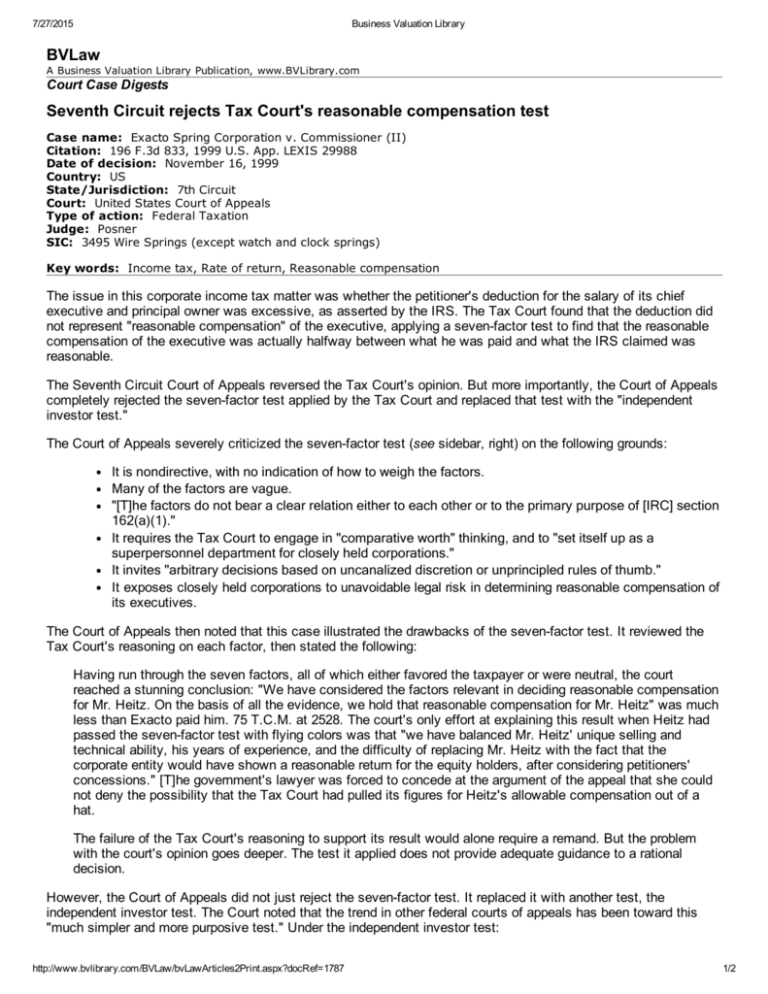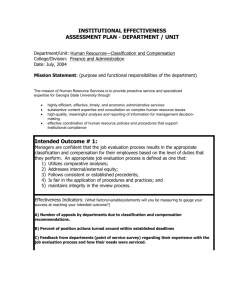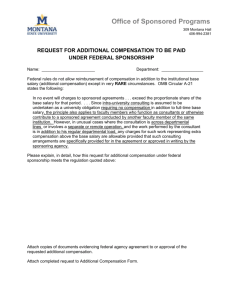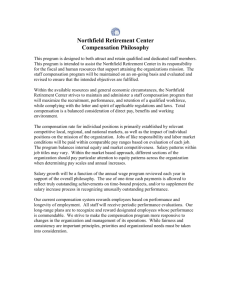
7/27/2015
Business Valuation Library
BVLaw
A Business Valuation Library Publication, www.BVLibrary.com
Court Case Digests
Seventh Circuit rejects Tax Court's reasonable compensation test
Case name: Exacto Spring Corporation v. Commissioner (II)
Citation: 196 F.3d 833, 1999 U.S. App. LEXIS 29988
Date of decision: November 16, 1999
Country: US
State/Jurisdiction: 7th Circuit
Court: United States Court of Appeals
Type of action: Federal Taxation
Judge: Posner
SIC: 3495 Wire Springs (except watch and clock springs)
Key words: Income tax, Rate of return, Reasonable compensation The issue in this corporate income tax matter was whether the petitioner's deduction for the salary of its chief
executive and principal owner was excessive, as asserted by the IRS. The Tax Court found that the deduction did
not represent "reasonable compensation" of the executive, applying a seven­factor test to find that the reasonable
compensation of the executive was actually halfway between what he was paid and what the IRS claimed was
reasonable.
The Seventh Circuit Court of Appeals reversed the Tax Court's opinion. But more importantly, the Court of Appeals
completely rejected the seven­factor test applied by the Tax Court and replaced that test with the "independent
investor test."
The Court of Appeals severely criticized the seven­factor test (see sidebar, right) on the following grounds:
It is nondirective, with no indication of how to weigh the factors.
Many of the factors are vague.
"[T]he factors do not bear a clear relation either to each other or to the primary purpose of [IRC] section
162﴾a﴿﴾1﴿."
It requires the Tax Court to engage in "comparative worth" thinking, and to "set itself up as a
superpersonnel department for closely held corporations."
It invites "arbitrary decisions based on uncanalized discretion or unprincipled rules of thumb."
It exposes closely held corporations to unavoidable legal risk in determining reasonable compensation of
its executives.
The Court of Appeals then noted that this case illustrated the drawbacks of the seven­factor test. It reviewed the
Tax Court's reasoning on each factor, then stated the following:
Having run through the seven factors, all of which either favored the taxpayer or were neutral, the court
reached a stunning conclusion: "We have considered the factors relevant in deciding reasonable compensation
for Mr. Heitz. On the basis of all the evidence, we hold that reasonable compensation for Mr. Heitz" was much
less than Exacto paid him. 75 T.C.M. at 2528. The court's only effort at explaining this result when Heitz had
passed the seven­factor test with flying colors was that "we have balanced Mr. Heitz' unique selling and
technical ability, his years of experience, and the difficulty of replacing Mr. Heitz with the fact that the
corporate entity would have shown a reasonable return for the equity holders, after considering petitioners'
concessions." [T]he government's lawyer was forced to concede at the argument of the appeal that she could
not deny the possibility that the Tax Court had pulled its figures for Heitz's allowable compensation out of a
hat.
The failure of the Tax Court's reasoning to support its result would alone require a remand. But the problem
with the court's opinion goes deeper. The test it applied does not provide adequate guidance to a rational
decision.
However, the Court of Appeals did not just reject the seven­factor test. It replaced it with another test, the
independent investor test. The Court noted that the trend in other federal courts of appeals has been toward this
"much simpler and more purposive test." Under the independent investor test:
http://www.bvlibrary.com/BVLaw/bvLawArticles2Print.aspx?docRef=1787
1/2
7/27/2015
Business Valuation Library
A corporation can be conceptualized as a contract in which the owner of assets hires a person to manage
them. The owner pays the manager a salary and in exchange the manager works to increase the value of the
assets that have been entrusted to his management; that increase can be expressed as a rate of return to the
owner's investment. The higher the rate of return (adjusted for risk) that a manager can generate, the greater
the salary he can command. If the rate of return is extremely high, it will be difficult to prove that the manager
is being overpaid, for it will be implausible that if he quit if his salary was cut, and he was replaced by a lower­
paid manager, the owner would be better off; it would be killing the goose that lays the golden egg.
Applying the independent investor text to the facts as found by the Tax Court in this case, the Court of Appeals
noted that the investors of Exacto Spring, according to one of the experts, would expect a 13% return on their
investment. Since the Tax Court found that the investors actually enjoyed a 20% return, the executive's
compensation passed the independent investor test. Therefore, the Court of Appeals reversed the Tax Court's
opinion "with directions to enter judgment for the taxpayer."
Seven Factor Test
1. The type and extent of the services rendered,
2. The scarcity of qualified employees,
3. The qualifications and prior earning capacity of the employee,
4. The contributions of the employee to the business venture,
5. The net earnings of the employer,
6. The prevailing compensation paid to employees with comparable jobs, and
7. The peculiar characteristics of the employer's business.
Last update:
12/28/2004 1:20:07 PM
Article #1787
Copyright © 2015 Business Valuation Resources, LLC. All rights reserved.
(503) 291­7963 Accessed: Monday, 7/27/2015 12:35:23 PM. Prepared for: Sarah Andersen , BVR
http://www.bvlibrary.com/BVLaw/bvLawArticles2Print.aspx?docRef=1787
2/2







